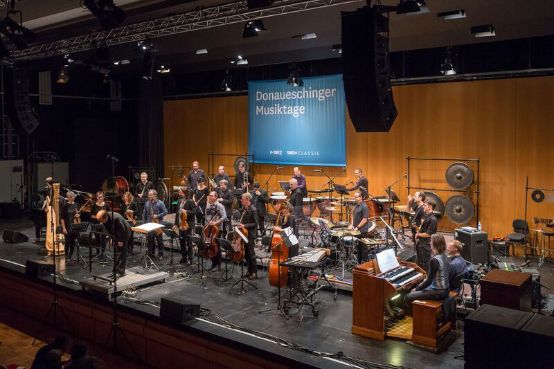Plural positions
Works by Michael Wertmüller and Martin Jaggi at the Donaueschingen Music Festival 2016

Once again: disturbing moments. The English philosopher Roger Scruton takes to the stage in Donaueschingen. Scruton was once an advisor to Margaret Thatcher and wrote a book about the music of the 20th century. Now he is lecturing in English on contemporary music or what he considers to be new music: works by Arnold Schönberg, Pierre Boulez or Karlheinz Stockhausen. Scruton's conclusions: New Music has got bogged down in systems, has taken as little account of the ear as it has of something as nebulous as "physiological conditions of perception". Ergo: contemporary music is now only a matter for the species that meets every year in Donaueschingen, for example. The audience applauded dutifully after the lecture and quickly left the room in the knowledge that it was hardly worth responding to the speaker. Listing Scruton's mistakes alone would go beyond the scope of the presentation. No: Theodor W. Adorno did not favor Schoenberg's twelve-tone technique. No: The ear is not a suprahistorical constant. No: even Beethoven was not a popular mass phenomenon who wrote beautiful melodies that everyone understood. And no again: New Music festivals are well attended, whether in Berlin, Stuttgart, Oslo, Warsaw or Donaueschingen, where, in contrast to the 1950s or 1960s, not only 50 composers and theorists met, but - according to the organizer's press release - 10,000 people who are open to and interested in what today's composers and sound artists are working on.
Mergers
Positions such as the extremely conservative one described have become obsolete, and not only in Donaueschingen. Music history has long been taking place in the plural - and festivals such as the Donaueschingen Music Days reflect this. Swiss composer Michael Wertmüller brings the fantastic jazz-hardcore trio Steamboat Switzerland with Marino Pliakas (bass), Lucas Niggli (drums) and Dominik Blum (Hammond organ) together with the new music ensemble Klangforum Wien. This world premiere is rhythmically gripping, dense and energetic discord. The presence of both formations, which play incredibly precisely "on point" under the direction of conductor Titus Engel, is impressive. Wertmüller has little interest in organic unity. Again and again there are breaks, caesuras, general pauses, then also paratactic elements in the form of virtuoso solo passages on the Hammond organ, the electric bass or the clarinets and xylophone. The former drummer Wertmüller is experienced in the encounter between jazz/rock and what is known as new music. In the end, however, the sound balance remains problematic. Even when the electric bass and Hammond organ play quietly, even when Lucas Niggli is restrained on the drum set - fusion has its limits where dynamics do not fuse.
"Megaheterophony"
Last year there was unanimous agreement: it was a bad year with too many concepts and ideas instead of well thought-out music. Now it sounded better. Admittedly, there was boring music again this year, and sometimes - which is better - experiments that went wrong. On the other hand, quite a few of the 17 world premieres remain in good memory. The new concerto for trombone and orchestra by Austrian composer Georg Friedrich Haas sounds serenely confident in the concluding orchestral concerto. Haas' personal style corresponds to the sustained, microtonal soundscapes, which soloist Mike Svoboda enriches with wonderfully radiant and penetrating trombone tones. The new work by Martin Jaggi, born in Basel in 1978, was eagerly awaited. With his impressive work from 2008 Juggernaut for large orchestra, he still indulged in rather dark colors. In the now premiered Caral for orchestra begins with four flutes, which - slightly out of tune microtonally - present a musical culture threatened with extinction. The flute quartet plays melodies from the Andes, more precisely from the Bolivian and Peruvian plateaus, to which the orchestra responds in what Jaggi himself calls a kind of "mega-heterophony". As in Juggernaut Jaggi achieves the feat of formal coherence, even subliminal logic. Nothing breaks apart here despite all the sonic unruliness, despite all the different elements that give the work a colorful, but also profound face. Jaggi says that he certainly does not want to repeat himself. But this Caral will hopefully sound again soon.
See also: Report by Marco Frei in the NZZ from October 19, 2016








